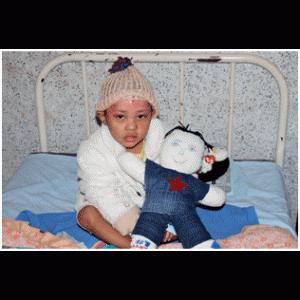
In the words of volunteer Mario Gutierrez
Every once in while on these surgical volunteer camps reality raises its head, stares you in the face, strikes you deep down in your soul and reminds you just why we do this. Today was a one of those days. After the organized chaos of the first couple of days of getting to know each other, setting up the supply room, organizing the operating theater and just getting into the daily routine of the ebb and flow from pre-op to recovery, the third day usually goes smoothly. That day, we had a full schedule and thought we would be there late, but this remarkable team of 18 gelled very quickly, and surprisingly we were nearly through 13 cases in reasonable time. Lots of cleft palates, cleft lips, fistulas, a variety of burn contractures, cute kid with ear tags that Dr. Jack removed under local, and then, the last case, PATIENT #36 came out of surgery.
PATIENT #36’s name is Pema Yengehen. She is a 21 year old, married women and mother, and until February 18 lived with her husband and three year old daughter in her town of Chambkar. That was the day her life changed forever. A raging fire swept through her neighborhood—the second time in three months. At about 1:30 am, she was awakened by her daughter Jamyang, Patient #37, who had run into their room screaming and crying, “Mama my arms are hot!!” Realizing that Jamyang’s arms were on fire, Pema grabbed her and pulled her to her chest to put out the flames and shield her from the now raging fire. Her husband then ran to find a way for all of them to escape. Passing through one of the doors, he disappeared as the roof suddenly collapsed engulfing him completely in flames. Pema then ran in the other direction, now with her hair and much of her body in flames, but holding Jamyang to her chest, she was able to run outside and out of harm’s way.
She and her daughter were taken to the hospital in Thimphu. Pema had second and third -degree burns over 30% of her body—her entire head, arms, and feet. Her wounds became so badly infected that she was not expected to live. Then hope arrived when the 2011 Surgicorps team landed in Paro to conduct its volunteer surgery camp, and they were transferred to the hospital where we would be working.
Fortunately, her daughter Jamyang’s burns were not serious and she had a skin graft taken from her thigh to treat her most serious burns on her wrist and hand.
The first time I saw Pema was during our first day at the hospital for pre-op. After the initial shock of seeing the complete burns to her face, head, and shoulders, I became acutely aware of the deep sorrow in her eyes. Pema was scheduled to be treated every day, first having her infections cleaned and then having skin grafts performed on different parts of her body. This day, Dr. David Kim completed some more debridement (cleaning of her wounds) and, as is normally the case, she was brought to the open area outside of the operating room for recovery.
Then, something remarkable happened.
As Pema began waking from her anesthesia, she appeared to go into a trance. Slowly, her face that was always full of sorrow and tears seemed to be transformed, and she even appeared to smile. The Surgicorps volunteers who were assisting in recovery at the time became transfixed as she then began to speak, having a serious conversation, complete with changing expressions in her face. And stranger still, her voice seemed disembodied, as if it was coming from another place, as she was still wearing an oxygen mask. As everyone in the area became aware of what was happening, the room became very quiet as we listened to the on-going dialogue she seemed to be having with herself. We then asked our translators Pema and Wangmo from the Tarayana Foundation, our local support organization, to tell us what she was saying which became increasingly difficult and painful for them as they realized that she was reliving all of the terrible things that had happened in her young life—including the fire. Then, she spoke directly to her husband who perished in the fire. “Thank you..it was because of you that Pamyang and I are alive…you gave your life for us.” Then she spoke tenderly to Pamyang, telling her not to be worried, that she will be always be safe and that she will always be there to take care of her and love her.
And at that moment, as we all looked at each other with tears streaming down our faces, we realized, once again, why we were all there, and why we will continue to do this work, wherever we are needed, as long as we are capable.

